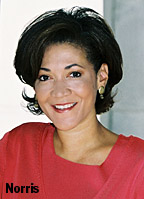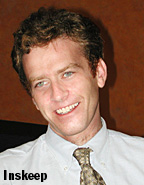
Fresh talent gives All Things Considered license to experiment
Originally published in Current,
Dec. 2, 2002
By Mike Janssen
As you listen for new voices on NPR’s All Things Considered, listen also for change.
Three new hosts are settling behind microphones at the network’s longest-running show in an almost complete turnover of its on-air lineup. Their unique interests and personalities will influence the program’s sound and content, and their arrival gives producers a chance to test new features and stylistic touches.
The show already sounds different on weekends. Host Steve Inskeep, who started last month, is shaping a newsier show that responds more quickly to breaking events.
Changes in the weeknight ATC will come soon. Michele Norris and Melissa Block, who start hosting Dec. 9 [2002] and in February, respectively, have been working behind the scenes, preparing reports and fine-tuning on-air skills. But their producers are already testing subtler changes.
The long search that led to Inskeep, Block and Norris began earlier this year when three hosting slots opened up. Linda Wertheimer left the weeknight show Jan. 1 to report on national politics, ending the show’s 12-year run with the same trio of hosts. Her co-host Noah Adams began a yearlong break in March to write a book and announced he would return to reporting after his leave. (Co-host Robert Siegel is staying put.) And Lisa Simeone left weekend ATC to return to freelancing.
Stretches without permanent hosts agitate program directors, who prefer consistent voices to welcome listeners, and the disruption can hinder NPR’s efforts to experiment.
"We’ve had good producers and great ideas, and harnessing these ideas with the continuity of a single host has been something we’ve yearned for for quite some time," said Walter Ray Watson, senior supervising producer of weekend ATC. "You don’t finish the program without having a permanent host in the chair."
"It’s a prime opportunity for the show to grow in new directions, and that’s what I’m expecting to happen," said Bruce Drake, NPR’s v.p. of news.
No more "lone wolf"
ATC opened Sunday, Nov. 17, with an unusual story: a "political history" of Saddam Hussein that tracked the Iraqi leader’s rise in politics and told how he holds power with a combination of charm and cruelty.
What was unusual was that host Inskeep reported and narrated the piece. Weekend ATC has often led with interviews or reported pieces, much like its weekday counterpart. The new tack highlights Inskeep’s desire to apply past experience—eight years of hard-news reporting for NPR—to his new gig.
"This job is only important to me if it is a way that I can do great journalism and great reporting," he said.
Inskeep plans to report a story a week. So far he’s covered congressional redistricting in Georgia, weapons inspections in Iraq and the Arab television news network al-Jazeera. He said he aspires to report pieces with greater depth and context than you might hear on a weekday, like a story you might see on television’s 60 Minutes or read in the New Yorker.
"We have an opportunity on the weekend to do stories that make sense of the news—that stop a fast-flowing river to dredge it, to look a little more closely at things," he said.
Watson also wants to build on Inskeep’s reporting background—in fact, it’s one quality that got him the job—but noted that hosting also requires compromise.
"He’s used to being something of a lone wolf . . . but I think there’s a variety of options available to him by working with this team of producers, rather than simply working in a vacuum," Watson said. "It takes a while for him to fully see what more can be accomplished through that collaboration, but it’s slowly but surely coming together."
Inskeep has been doing call-in segments every other week with Randy Cohen, author of "The Ethicist" column in the New York Times Magazine. Cohen answers questions submitted by listeners, who then say whether they agree with his advice.
Inskeep also wants to respond more readily to news that breaks on weekends, drawing on extra effort from the network’s national and foreign desks.
Taking down the wall between hosts
Though Norris and Block have not yet begun hosting, they may bring greater changes to the weeknight show. The two hosts are years younger than their predecessors from NPR’s founding generation, and Norris is African-American. The show also has a new executive producer, Christopher Turpin, who moved into his position in September.
"Some things will change automatically because you have two new people, and they have different tastes and different interests, and inevitably that changes the nature of the show," Turpin said.
In Block, ATC found an established NPR journalist who worked closely with the show for almost a decade. She started in 1985 by booking interviews for Adams, and later served as an editor, director and associate producer. For her last three years at ATC, she worked as senior producer, the exhausting hands-on daily management job that Turpin held until recently.
"The best hosts are the ones with the broadest interests," Block said, counting herself in that class. After leaving ATC in 1994, she reported for NPR on a variety of topics, including law, art, education, violence in Kosovo and the Sept. 11 attacks on the World Trade Center. She also substitute-hosted for ATC and Morning Edition.
"She has a lovely touch with music, and a lovely human touch with guests," said Turpin, who also spoke warmly of her "sparkle."
NPR also made a "very concerted effort" to look for a host outside the building, Turpin said. That’s where it found Norris, a former correspondent for ABC’s World News Tonight with Peter Jennings. The search committee also had diversity in mind, and adding Norris broadens the racial scope of NPR’s host roster.
Norris said she was happy at ABC when NPR contacted her but realized the opportunity they dangled was "quite special." She plans to continue reporting on topics that interested her in television, including education and social issues.
With his hosts still off-mike, Turpin hesitated to divulge specifics about ATC’s future. But he did say hosts should interact more. "When I talk to listeners, one of the first things they ask me is, ‘Why do the hosts never talk to each other?’" he said.
He doesn’t see Siegel, Block and Norris indulging in the kind of "happy talk" you might see on local TV newscasts. But perhaps two hosts, rather than one, could interview a guest, he said.
Hosts also may begin reacting to commentaries that just aired, or come out of reports by talking about what they heard.
"Some of the best and most amusing and entertaining parts of the host dynamic happen just before the mikes open and we do the formal business of radio," Turpin said.
| Melissa
Block begins work as co-host of the weeknight ATC
in February 2003, when she returns from maternity leave.
Michele Norris, a correspondent for ABC’s World News Tonight and newcomer to radio, starts Dec. 9 as co-host of the weeknight ATC.
Norris and Block join co-host Robert Siegel, who remains with the show. Steve Inskeep, an NPR correspondent, started as weekend host of ATC on Nov. 1.
—adapted from Current, Oct. 7 and 21, 2002 |
 |
To Current's home page |
| Earlier news: ATC celebrated its 30th anniversary in 2001. | |
 |
Outside link: ATC's site. |
Web page posted Dec.
11, 2002
Current
The newspaper about public television and radio
in the United States
A service of Current Publishing Committee, Takoma Park, Md.
E-mail: web![]() current.org
current.org
301-270-7240
301-270-7240
Copyright 2002
 Block
has worked at NPR since 1985 as an editor, producer, reporter and
director. She worked on ATC for nine years and was the show’s
senior producer for three years. In 1994 she became a reporter in
NPR’s New York bureau, where she covered the Sept. 11 World Trade
Center attacks and other stories ranging from news to human-interest
features.
Block
has worked at NPR since 1985 as an editor, producer, reporter and
director. She worked on ATC for nine years and was the show’s
senior producer for three years. In 1994 she became a reporter in
NPR’s New York bureau, where she covered the Sept. 11 World Trade
Center attacks and other stories ranging from news to human-interest
features.  Norris,
41, has covered education, poverty and social issues for ABC since
1993. Before entering TV she reported for the Washington Post,
Chicago Tribune and Los Angeles Times.
Norris,
41, has covered education, poverty and social issues for ABC since
1993. Before entering TV she reported for the Washington Post,
Chicago Tribune and Los Angeles Times. Inskeep,
34, covers Congress and national security. He covered last year’s
Sept. 11 attacks and reported from Afghanistan and Pakistan. He
also reported on the 2000 presidential campaign, civil war in Colombia,
and such offbeat subjects as rats, wrestlers and a West Virginia
town with a population of 11. He joined NPR in 1996.
Inskeep,
34, covers Congress and national security. He covered last year’s
Sept. 11 attacks and reported from Afghanistan and Pakistan. He
also reported on the 2000 presidential campaign, civil war in Colombia,
and such offbeat subjects as rats, wrestlers and a West Virginia
town with a population of 11. He joined NPR in 1996.